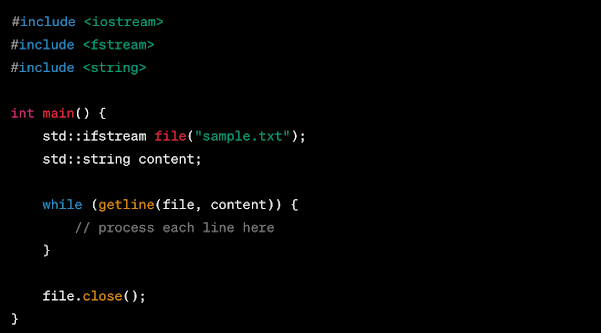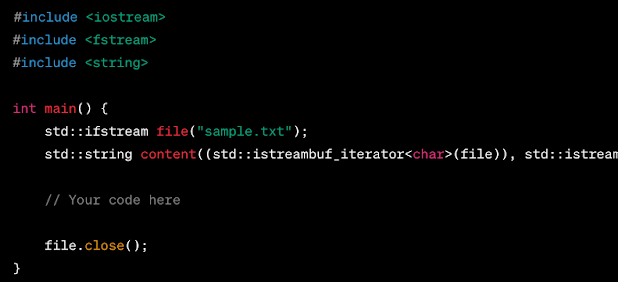C++ has been a mainstay in the world of programming for decades, offering robust tools and libraries for efficient code writing. Among its many capabilities, reading files into strings is a fundamental task. Whether you’re a beginner or looking to brush up your skills, this guide is for you. By the end, you’ll be well-versed in various techniques and best practices.
Understanding C++ File I/O
C++ employs various methods and classes for file handling. Grasping these basics ensures smooth sailing as we delve deeper.
Why File Handling is Crucial
Imagine developing a game without saving progress or a software without configuration files. File handling is the bridge that connects persistent storage with transient program execution.
The Building Blocks: Libraries & Classes
Before diving into the mechanics, understanding the libraries and classes at play is essential.
Essential Libraries
- <fstream>: The heart of file operations in C++. From reading to writing, everything revolves around it;
- <iostream>: For basic input-output operations. Often coupled with <fstream> for comprehensive functionality.
Key Classes
- ifstream: For reading input from files;
- ofstream: Dedicated for writing to files;
- fstream: A dual-purpose class for both reading and writing.
The Techniques: Reading Files into Strings
A single task, myriad ways. Let’s explore how C++ offers flexibility in reading files.
Using getline() with ifstream
This method allows for reading a file line by line.
Code Snippet:

The Streambuf Approach
An elegant solution, it reads the entire file in a go.
Code Snippet:

Pitfalls & Best Practices
A road filled with pitfalls can lead to inefficiencies. But fear not, we’ve got the map.
Common Mistakes
- Not Checking for File Open Errors: Always ensure the file opened successfully;
- Forgetting to Close Files: An open file can lead to memory leaks.
Pro Tips
- Always use the RAII (Resource Acquisition Is Initialization) principle for automatic file closure;
- Opt for modern C++ techniques like smart pointers for memory management.
Comparing Techniques
Ever wondered which method is the best? Let’s dissect and decide.
| Method | Efficiency | Use Case | Complexity |
|---|---|---|---|
| getline() with ifstream | Moderate | Reading line by line | Low |
| Streambuf Approach | High | Reading entire file | Medium |
Diverging Paths: Zero Padding a String in Python
Sometimes in the realm of programming, we often traverse between languages. While our primary focus is C++, it’s worth taking a brief detour to understand a commonly used technique in Python: zero padding a string. This practice is especially handy when working with strings representing numbers.
The Essence of Zero Padding
Imagine you have a series of numbers, and for alignment or database purposes, you want them all to be the same length. This is where zero padding comes into play. By adding zeros to the beginning of a number string until it reaches a desired length, uniformity is achieved.
Python’s Built-in Method
Python offers a straightforward way to zero pad strings using the str.zfill() method.
Code Snippet:

Using String Formatting
Another elegant method Python offers is using string formatting.
Code Snippet:

When to Use Zero Padding in Python?
- Database Management: Ensuring uniform data entries, especially for fields like ZIP codes;
- UI/UX: To align numeric data for better readability;
- File Naming: For sequentially named files (e.g., image001, image002).

Conclusion
From the basics to the intricacies, we’ve covered the journey of reading a file into a string in C++. With the right tools and techniques in your arsenal, handling files in C++ becomes not just easy, but enjoyable.
FAQs
While it’s good practice, modern C++ compilers often close files automatically when they go out of scope.
Technically yes, but it would be chunk by chunk, not all at once.
No, they’re platform-independent, ensuring consistent functionality across systems.
ifstream is solely for reading, while fstream supports both reading and writing.
Yes, but consider tools specifically designed for big data for optimal performance.